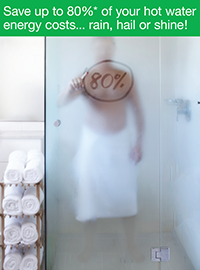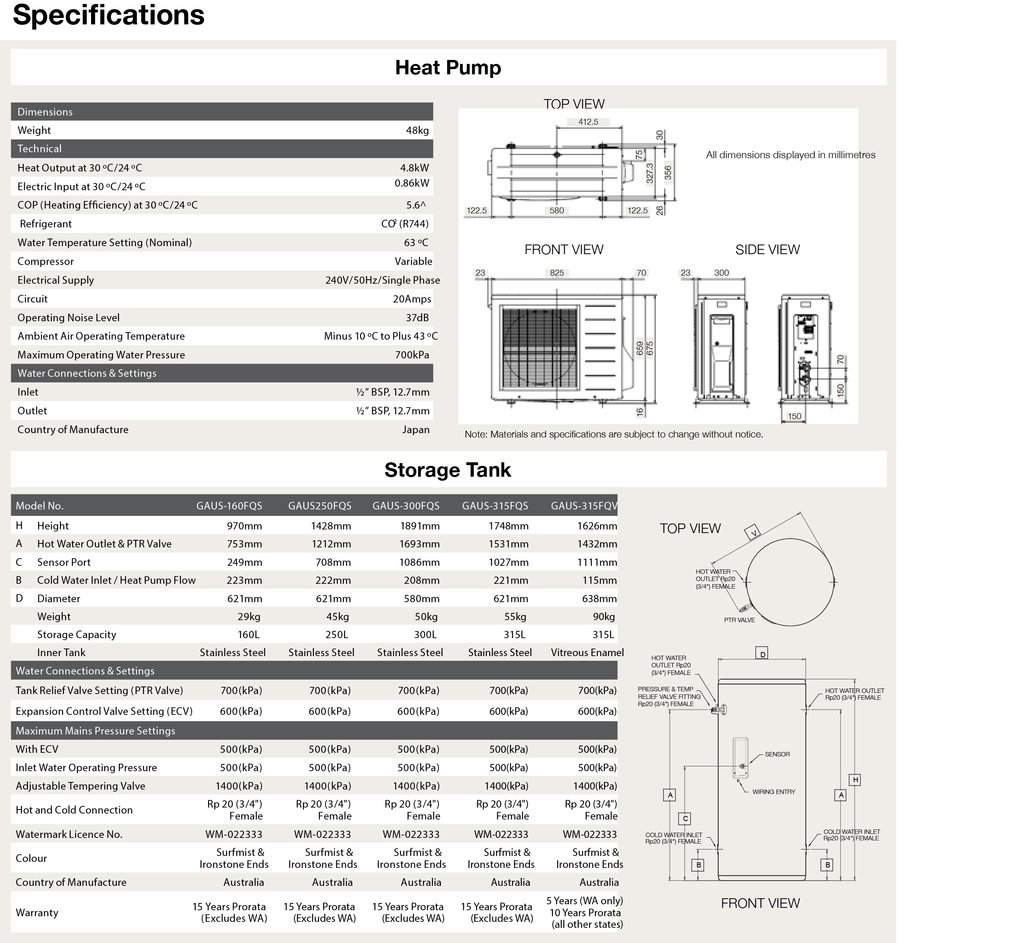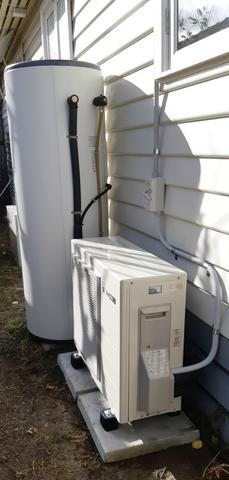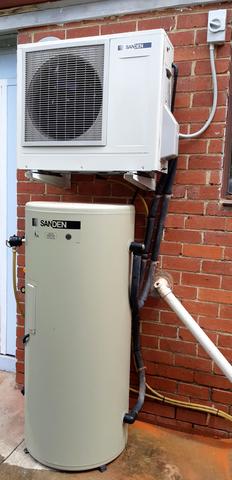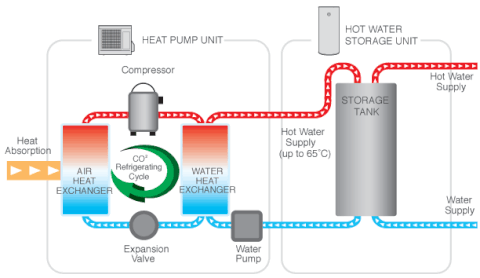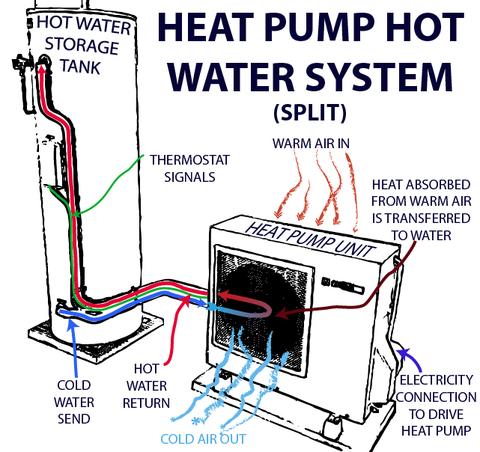EnviroGroup are an accredited Sanden dealer and Installer and have been installing Sanden Heat Pumps in Melbourne, Victoria since 2012.
Call us on 1800 430430 or Request a Quote using the form at the bottom of this page to start a discussion about an efficient and environmentally friendly hot water system to best suit your needs.
Benefits of Heat pumps
Compared to an electric storage unit the Sanden Heat Pump system will use around 80% less electricity to heat the same amount of water. If you have installed Solar electric panels at your property, then you can make use of your own clean electricity to power the heat pump. The only running costs are what you’ve lost through not exporting the power, which is getting less and less in recent times. The Sanden Heat Pump can be programmed to allow you to control when it operates so that it only runs during the warmest part of the day or when your PV production is at its maximum, even on a Winter day. When replacing an Electric Hot Water storage system with a Sanden Heat Pump, the EnviroShop is able to claim a STC rebate on your behalf from the Australian Government and VEEC’s from the Victorian Government for installing an Efficient Heat Pump. When replacing a Gas storage or instant Hot Water system with a Sanden Heat Pump, the EnviroShop is able to claim on your behalf a STC rebate from the Australian Government for installing an Efficient Heat Pump. These rebates are provided to you as a discount upfront on your quote so you do not have to wait for a refund.
COP & Efficiency
The reason there is a big push towards heat pumps for hot water generation is the efficiency with which they use electricity and energy to produce hot water. The Coefficient of Performance (C.O.P.) is used to rank a systems ability to produce heat efficiently. A Sanden Heat Pump on a nice winters day of 20°C day has a COP of 5.0, or 500% efficient, which is a standout for heat pumps.
Gas storage or instant gas systems are between 75% to 90% efficient. Older units drop off by 5-10%. An electric storage system is around 90 – 100% efficient, meaning most of the heat produced gets into the water. One other factor to consider is standing losses. The heat lost to the surrounding environment even when you’re not consuming any hot water yourself has to be replaced each day. The better insulated your tank and connections are, the lower the standing losses. Older hot water systems tend to have less well-insulated tanks as well as being installed without proper insulation on the pipes and fittings, leading to excessive heat loss and reduced efficient. Gas storage systems are even worse. The system that allows heat to be transferred from the hot exhaust gases into the water also allows losses from the water tank back into the environment when the burner isn’t operating.
About Sanden Heat Pumps
Sanden International have manufactured refrigeration and air conditioning technology in Japan for over 70 years and entered the Australian market in 2012 with their Eco Plus Heat Pump system (Update to the previous EcoCute model). Sanden’s class leading warranty of 6 yrs for the heat pump (all electric’s, pump and compressor) and 15 yrs for the tank is a statement that they are willing to back the quality of their heat pump. This makes Sanden the perfect replacement for your Gas or Electric Hot water storage system.
Sizing the Unit & Noise
The Sanden Heat Pump system is split into two parts; the tank and Heat pump unit. This allows the tank to be mounted in place of your existing Gas or Electric Hot water storage system. The storage tank can be mounted outside or inside in the laundry, underneath the staircase, in a cupboard or in the garage etc. The tank is available in 4 sizes; 160L, 250L, 300L & 315L. Ask us for advice on what is an appropriate size for your home.
The heat pump is then mounted outside on the ground, wall or roof. This allows for more flexibility on the install location and the ability to keep your exterior paths and yards clear. As the Sanden unit is the quietest on the market by a long margin it can be placed near bedrooms or your neighbours without noise concerns. More often than not you will feel the air movement from the fan before you will hear the unit.
Refrigerant-Environment Impact
All heat pumps make use of refrigerant gases to absorb the heat in the air which is then compressed to increase the temperature and allow heat to be transferred to the water, providing you with a tank full of 60 degree water waiting for you to turn on the tap. Sanden makes use of a refrigerant labelled R744 which is actually CO2. This is important as CO2 has the lowest Global Warming Potential of all refrigerants on the market. The CO2 has a GWP of 1 and Ozone Depleting Potential (ODP) of 0, which is fantastic and makes it the most environmentally friendly heat pump on the market. The other commonly used refrigerants used on the market for heat pumps, refrigerators and split systems are R134a & R410A. They are rated as follows, R134a GWP 1430 & ODP 0, R410a GWP 2088 & ODP 0. Most refrigerants end up escaping into the air, either through slow leaking in the heat pump or through lack of careful capture in the recycling process. It has been estimated that using less damaging refrigerants is one of the biggest steps we can make to tackle climate change and the greenhouse effect.
What is a Heat Pump
Heat pump is a term given to products that are able to absorb heat in one location and transfer it (pump it) to another. One of the most common heat pumps that everyone has in their house is the refrigerator. It uses a refrigerant gas to absorb heat from inside the fridge keeping your food and drinks cool and then releases that heat at the back of the fridge to the air in your kitchen. Now we have two other common products that make use of this same principle, but they put this absorbed heat to use. They are the Reverse cycle Air conditioner and the Hot water Heat pump.
To find out all you need to know about Sanden Heat Pumps in Melbourne, call us now on 1800 430430 or complete the enquiry form and we will contact you.


